 Tìm kiếm
Tìm kiếm
Chương I Luật tổ chức Toà án nhân dân 2014: Những quy định chung
| Số hiệu: | 62/2014/QH13 | Loại văn bản: | Luật |
| Nơi ban hành: | Quốc hội | Người ký: | Nguyễn Sinh Hùng |
| Ngày ban hành: | 24/11/2014 | Ngày hiệu lực: | 01/06/2015 |
| Ngày công báo: | 29/12/2014 | Số công báo: | Từ số 1167 đến số 1168 |
| Lĩnh vực: | Bộ máy hành chính | Tình trạng: | Còn hiệu lực |
TÓM TẮT VĂN BẢN
Sẽ có thêm Tòa án nhân dân cấp cao
Từ 01/06/2015, hệ thống tổ chức Tòa án nhân dân (TAND) sẽ có thêm TAND cấp cao, đây là điểm mới nổi bật trong Luật tổ chức TAND 2014.
Ngoài ra, còn có nhiều điểm mới khác, như là:
- Đưa vào Luật nội dung Thư ký Tòa án gồm các ngạch: thư ký viên, thư ký viên chính, thư ký viên cao cấp;
- Tương tự, Thẩm tra viên cũng được phân thành ba ngạch: thẩm tra viên, thẩm tra viên chính, thẩm tra viên cao cấp;
- Nhiệm kỳ đầu của thẩm phán là 05 năm; trường hợp được bổ nhiệm lại hoặc bổ nhiệm vào ngạch thẩm phán khác thì nhiệm kỳ tiếp theo là 10 năm;
- Ngạch thẩm phán gồm: Thẩm phán TAND tối cao, thẩm phán cao cấp, thẩm phán trung cấp, thẩm phán sơ cấp.
Luật này thay thế Luật tổ chức TAND 2002.
Văn bản tiếng việt
Văn bản tiếng anh
Luật này quy định về chức năng, nhiệm vụ, quyền hạn và tổ chức bộ máy của Tòa án nhân dân; về Thẩm phán, Hội thẩm và các chức danh khác trong Tòa án nhân dân; về bảo đảm hoạt động của Tòa án nhân dân.
1. Tòa án nhân dân là cơ quan xét xử của nước Cộng hòa xã hội chủ nghĩa Việt Nam, thực hiện quyền tư pháp.
Tòa án nhân dân có nhiệm vụ bảo vệ công lý, bảo vệ quyền con người, quyền công dân, bảo vệ chế độ xã hội chủ nghĩa, bảo vệ lợi ích của Nhà nước, quyền và lợi ích hợp pháp của tổ chức, cá nhân.
Bằng hoạt động của mình, Tòa án góp phần giáo dục công dân trung thành với Tổ quốc, nghiêm chỉnh chấp hành pháp luật, tôn trọng những quy tắc của cuộc sống xã hội, ý thức đấu tranh phòng, chống tội phạm, các vi phạm pháp luật khác.
2. Tòa án nhân danh nước Cộng hòa xã hội chủ nghĩa Việt Nam xét xử các vụ án hình sự, dân sự, hôn nhân và gia đình, kinh doanh, thương mại, lao động, hành chính và giải quyết các việc khác theo quy định của pháp luật; xem xét đầy đủ, khách quan, toàn diện các tài liệu, chứng cứ đã được thu thập trong quá trình tố tụng; căn cứ vào kết quả tranh tụng ra bản án, quyết định việc có tội hoặc không có tội, áp dụng hoặc không áp dụng hình phạt, biện pháp tư pháp, quyết định về quyền và nghĩa vụ về tài sản, quyền nhân thân.
Bản án, quyết định của Tòa án nhân dân có hiệu lực pháp luật phải được cơ quan, tổ chức, cá nhân tôn trọng; cơ quan, tổ chức, cá nhân hữu quan phải nghiêm chỉnh chấp hành.
3. Khi thực hiện nhiệm vụ xét xử vụ án hình sự, Tòa án có quyền:
a) Xem xét, kết luận về tính hợp pháp của các hành vi, quyết định tố tụng của Điều tra viên, Kiểm sát viên, Luật sư trong quá trình điều tra, truy tố, xét xử; xem xét việc áp dụng, thay đổi hoặc hủy bỏ biện pháp ngăn chặn; đình chỉ, tạm đình chỉ vụ án;
b) Xem xét, kết luận về tính hợp pháp của các chứng cứ, tài liệu do Cơ quan điều tra, Điều tra viên, Viện kiểm sát, Kiểm sát viên thu thập; do Luật sư, bị can, bị cáo và những người tham gia tố tụng khác cung cấp;
c) Khi xét thấy cần thiết, trả hồ sơ yêu cầu Viện kiểm sát điều tra bổ sung; yêu cầu Viện kiểm sát bổ sung tài liệu, chứng cứ hoặc Tòa án kiểm tra, xác minh, thu thập, bổ sung chứng cứ theo quy định của Bộ luật tố tụng hình sự;
d) Yêu cầu Điều tra viên, Kiểm sát viên và những người khác trình bày về các vấn đề có liên quan đến vụ án tại phiên tòa; khởi tố vụ án hình sự nếu phát hiện có việc bỏ lọt tội phạm;
e) Ra quyết định để thực hiện các quyền hạn khác theo quy định của Bộ luật tố tụng hình sự.
4. Tòa án xác minh, thu thập tài liệu, chứng cứ để giải quyết các vụ việc dân sự, hôn nhân và gia đình, kinh doanh, thương mại, lao động, hành chính và thực hiện các quyền hạn khác theo quy định của luật tố tụng.
5. Xử lý vi phạm hành chính; xem xét đề nghị của cơ quan quản lý nhà nước và quyết định áp dụng các biện pháp xử lý hành chính liên quan đến quyền con người, quyền cơ bản của công dân theo quy định của pháp luật.
6. Ra quyết định thi hành bản án hình sự, hoãn chấp hành hình phạt tù, tạm đình chỉ chấp hành hình phạt tù, giảm hoặc miễn chấp hành hình phạt, xóa án tích, miễn, giảm nghĩa vụ thi hành án đối với khoản thu nộp ngân sách nhà nước; thực hiện các quyền hạn khác theo quy định của Bộ luật hình sự, Luật thi hành án hình sự, Luật thi hành án dân sự.
Ra quyết định hoãn, miễn, giảm, tạm đình chỉ chấp hành biện pháp xử lý hành chính do Tòa án áp dụng và thực hiện các quyền hạn khác theo quy định của Luật xử lý vi phạm hành chính.
7. Trong quá trình xét xử vụ án, Tòa án phát hiện và kiến nghị với các cơ quan có thẩm quyền xem xét sửa đổi, bổ sung hoặc hủy bỏ văn bản pháp luật trái với Hiến pháp, luật, nghị quyết của Quốc hội, pháp lệnh, nghị quyết của Ủy ban thường vụ Quốc hội để bảo đảm quyền và lợi ích hợp pháp của cá nhân, cơ quan, tổ chức; cơ quan có thẩm quyền có trách nhiệm trả lời Tòa án kết quả xử lý văn bản pháp luật bị kiến nghị theo quy định của pháp luật làm cơ sở để Tòa án giải quyết vụ án.
8. Bảo đảm áp dụng thống nhất pháp luật trong xét xử.
9. Thực hiện quyền hạn khác theo quy định của luật.
1. Tòa án nhân dân tối cao.
2. Tòa án nhân dân cấp cao.
3. Tòa án nhân dân tỉnh, thành phố trực thuộc trung ương.
4. Tòa án nhân dân huyện, quận, thị xã, thành phố thuộc tỉnh và tương đương.
5. Tòa án quân sự.
1. Ủy ban thường vụ Quốc hội quyết định thành lập, giải thể Tòa án nhân dân huyện, quận, thị xã, thành phố thuộc tỉnh và tương đương; Tòa án nhân dân tỉnh, thành phố trực thuộc trung ương; Tòa án nhân dân cấp cao và quy định về phạm vi thẩm quyền theo lãnh thổ của Tòa án nhân dân cấp cao theo đề nghị của Chánh án Tòa án nhân dân tối cao.
2. Ủy ban thường vụ Quốc hội quyết định thành lập, giải thể Tòa án quân sự khu vực, Tòa án quân sự quân khu và tương đương và quy định về phạm vi thẩm quyền theo lãnh thổ của mỗi Tòa án theo đề nghị của Chánh án Tòa án nhân dân tối cao sau khi thống nhất với Bộ trưởng Bộ Quốc phòng.
Các Tòa án nhân dân được tổ chức độc lập theo thẩm quyền xét xử.
1. Chế độ xét xử sơ thẩm, phúc thẩm được bảo đảm.
Bản án, quyết định sơ thẩm của Tòa án có thể bị kháng cáo, kháng nghị theo quy định của luật tố tụng. Bản án, quyết định sơ thẩm không bị kháng cáo, kháng nghị trong thời hạn do luật định thì có hiệu lực pháp luật.
Bản án, quyết định sơ thẩm bị kháng cáo, kháng nghị thì vụ án phải được xét xử phúc thẩm. Bản án, quyết định phúc thẩm của Tòa án có hiệu lực pháp luật.
2. Bản án, quyết định của Tòa án đã có hiệu lực pháp luật mà phát hiện có vi phạm pháp luật hoặc có tình tiết mới theo quy định của luật tố tụng thì được xem xét lại theo trình tự giám đốc thẩm hoặc tái thẩm.
1. Chế độ bổ nhiệm Thẩm phán được thực hiện đối với các Tòa án.
2. Chế độ bầu Hội thẩm nhân dân được thực hiện đối với Tòa án nhân dân tỉnh, thành phố trực thuộc trung ương, Tòa án nhân dân huyện, quận, thị xã, thành phố thuộc tỉnh và tương đương. Chế độ cử Hội thẩm quân nhân được thực hiện đối với Tòa án quân sự quân khu và tương đương, Tòa án quân sự khu vực.
Việc xét xử sơ thẩm của Tòa án có Hội thẩm tham gia theo quy định của luật tố tụng, trừ trường hợp xét xử theo thủ tục rút gọn.
1. Thẩm phán, Hội thẩm xét xử độc lập và chỉ tuân theo pháp luật; nghiêm cấm cơ quan, tổ chức, cá nhân can thiệp vào việc xét xử của Thẩm phán, Hội thẩm dưới bất kỳ hình thức nào.
2. Cá nhân, cơ quan tổ chức có hành vi can thiệp vào việc xét xử của Thẩm phán, Hội thẩm thì tùy theo tính chất, mức độ vi phạm mà bị xử lý kỷ luật, xử phạt hành chính hoặc truy cứu trách nhiệm hình sự theo quy định của pháp luật.
Tòa án nhân dân xét xử tập thể và quyết định theo đa số, trừ trường hợp xét xử theo thủ tục rút gọn. Thành phần Hội đồng xét xử ở mỗi cấp xét xử do luật tố tụng quy định.
1. Tòa án nhân dân xét xử kịp thời trong thời hạn luật định, bảo đảm công bằng.
2. Tòa án nhân dân xét xử công khai. Trường hợp đặc biệt cần giữ bí mật nhà nước, thuần phong, mỹ tục của dân tộc, bảo vệ người chưa thành niên hoặc giữ bí mật đời tư theo yêu cầu chính đáng của đương sự thì Tòa án nhân dân có thể xét xử kín.
Tòa án xét xử theo nguyên tắc mọi người đều bình đẳng trước pháp luật, không phân biệt dân tộc, giới tính, tín ngưỡng, tôn giáo, thành phần xã hội, địa vị xã hội; cá nhân, cơ quan, tổ chức đều bình đẳng trước Tòa án.
Nguyên tắc tranh tụng trong xét xử được bảo đảm. Tòa án có trách nhiệm bảo đảm cho những người tham gia tố tụng thực hiện quyền tranh tụng trong xét xử. Việc thực hiện nguyên tắc tranh tụng trong xét xử theo quy định của luật tố tụng.
Người bị buộc tội được coi là không có tội cho đến khi được chứng minh theo trình tự luật định và có bản án kết tội của Tòa án đã có hiệu lực pháp luật.
Quyền bào chữa của bị can, bị cáo, quyền bảo vệ lợi ích hợp pháp của đương sự được bảo đảm.
Bị can, bị cáo có quyền tự bào chữa, nhờ luật sư hoặc người khác bào chữa; đương sự khác trong vụ án có quyền tự mình hoặc nhờ người bảo vệ lợi ích hợp pháp của mình.
Tòa án có trách nhiệm bảo đảm quyền bào chữa của bị can, bị cáo, quyền bảo vệ lợi ích hợp pháp của đương sự.
Tiếng nói, chữ viết dùng trước Tòa án là tiếng Việt.
Tòa án bảo đảm cho những người tham gia tố tụng quyền dùng tiếng nói, chữ viết của dân tộc mình trước Tòa án nhân dân, trường hợp này phải có phiên dịch.
1. Cá nhân, cơ quan, tổ chức phải tôn trọng Tòa án.
2. Nghiêm cấm mọi hành vi xúc phạm, xâm hại đến sự tôn nghiêm, danh dự của Tòa án nhân dân, cản trở hoạt động của Tòa án; người có hành vi vi phạm thì tùy theo tính chất, mức độ vi phạm mà bị xử lý kỷ luật, xử phạt hành chính hoặc truy cứu trách nhiệm hình sự theo quy định, của pháp luật.
3. Khi thực hiện nhiệm vụ, quyền hạn của mình, Thẩm phán, Hội thẩm có quyền liên hệ với các cơ quan nhà nước, Ủy ban Mặt trận Tổ quốc Việt Nam, các tổ chức thành viên của Mặt trận, các tổ chức xã hội khác và công dân. Trong phạm vi chức năng, nhiệm vụ, quyền hạn của mình, các cơ quan, tổ chức và công dân có trách nhiệm thực hiện yêu cầu và tạo điều kiện để Thẩm phán, Hội thẩm làm nhiệm vụ.
1. Tòa án nhân dân phối hợp với cơ quan, tổ chức phát huy tác dụng giáo dục của phiên tòa và tạo điều kiện thuận lợi cho việc thi hành bản án, quyết định của Tòa án nhân dân.
2. Tòa án nhân dân cùng với cơ quan, tổ chức nghiên cứu, đề xuất các chủ trương, chính sách, pháp luật về phòng, chống vi phạm pháp luật và tội phạm, bảo đảm an ninh quốc gia, trật tự an toàn xã hội.
3. Trong trường hợp cần thiết, cùng với việc ra bản án, quyết định, Tòa án nhân dân kiến nghị yêu cầu cơ quan, tổ chức áp dụng biện pháp khắc phục nguyên nhân, điều kiện phát sinh tội phạm hoặc vi phạm pháp luật tại cơ quan, tổ chức đó. Cơ quan, tổ chức nhận được kiến nghị có trách nhiệm thực hiện và trong thời hạn 30 ngày, kể từ ngày nhận được kiến nghị phải thông báo cho Tòa án về kết quả giải quyết kiến nghị.
1. Tòa án nhân dân tối cao quản lý các Tòa án nhân dân về tổ chức.
2. Tòa án nhân dân tối cao chủ trì, phối hợp với Bộ Quốc phòng quản lý các Tòa án quân sự về tổ chức.
Quy chế phối hợp giữa Tòa án nhân dân tối cao và Bộ Quốc phòng trong việc quản lý các Tòa án quân sự về tổ chức do Ủy ban thường vụ Quốc hội quy định.
Quốc hội, các cơ quan của Quốc hội, Đoàn đại biểu Quốc hội, đại biểu Quốc hội, Hội đồng nhân dân, đại biểu Hội đồng nhân dân, Mặt trận Tổ quốc Việt Nam và các tổ chức thành viên của Mặt trận giám sát hoạt động của Tòa án nhân dân theo quy định của luật.
Chapter I
GENERAL PROVISIONS
Article 1. Scope of regulation
This Law prescribes functions, duties, powers and organizational structure of people’s courts; judges, assessors and other staffs in people’s courts; and assurance of operation of people’s courts.
Article 2. Functions, duties and powers of people’s courts
1. People’s courts are the judicial bodies of the Socialist Republic of Vietnam and exercise judicial power.
People’s courts have the duty to safeguard justice, human rights, citizens’ rights, the socialist regime, the interests of the State, and the lawful rights and interests of organizations and individuals.
Through their activities, courts shall contribute to educating citizens in the loyalty to the Fatherland, strict observance of law, respect for rules of social conduct and the sense of struggle to prevent and combat crimes and other violations.
2. In the name of the Socialist Republic of Vietnam, courts shall adjudicate criminal, civil, marriage and family, business, commercial, labor and administrative cases and settle other matters as prescribed by law; examine documents and evidences collected in the legal process in an adequate, objective and comprehensive manner; and base themselves on results of the adversarial process to make judgments or decisions on guilt or innocence, to apply or not to apply penalties and judicial measures, or decisions regarding property rights and obligations and personal rights.
Judgments and decisions of people’s courts which have taken legal effect shall be respected by agencies, organizations and individuals and strictly observed by concerned agencies, organizations and individuals.
3. When performing the duty of adjudicating criminal cases, courts have the following powers:
a/ To examine and conclude on the legality of procedural acts and decisions of investigators, procurators and defense counsels in the course of investigation, prosecution and trial; to consider the application, change or cancellation of deterrent measures; to cease or suspend cases;
b/ To examine and conclude on the legality of evidences and documents collected by investigating agencies, investigators, procuracies and procurators; and those provided by lawyers, the accused, defendants and other procedure participants;
c/ When finding it necessary, to return case files to procuracies for additional investigation; to request procuracies to add documents and evidences, or to examine, verify, collect or add evidences in accordance with the Criminal Procedure Code;
d/ To request investigators, procurators and other people to present matters related to cases at hearings; to institute criminal cases when detecting omission of crimes;
e/ To make decisions to exercise other powers in accordance with the Criminal Procedure Code.
4. Courts shall verify and collect documents and evidences to settle civil, marriage and family, business, commercial, labor and administrative cases and matters, and exercise other powers as prescribed by the procedural law.
5. Courts shall handle administrative violations; consider requests of state management agencies and decide whether to apply administrative handling measures related to human rights and citizens’ fundamental rights in accordance with law.
6. Courts shall issue decisions on execution of criminal judgments, postponement of the serving of imprisonment penalty, suspension of the serving of imprisonment penalty, reduction of, or exemption from serving, penalty, remission of previous criminal convictions, exemption from or reduction of the judgment serving obligation related to state budget remittances; and exercise other powers prescribed by the Penal Code, the Law on Execution of Criminal Judgments and the Law on Enforcement of Civil Judgments.
Courts shall issue decisions on postponement of, exemption from, reduction or suspension of execution of, administrative handling measures they apply, and exercise other powers prescribed by the Law on Handling of Administrative Violations.
7. During the trial of cases, courts shall detect and recommend competent agencies to consider and amend, supplement or annul legal documents which contravene the Constitution, laws or resolutions of the National Assembly, or ordinances or resolutions of the National Assembly Standing Committee in order to guarantee lawful rights and interests of individuals, agencies and organizations; and competent agencies shall reply to courts on results of handling such legal documents in accordance with law to serve as a basis for courts to settle cases.
8. Courts shall ensure the uniform application of law in trial.
9. Courts shall exercise other powers prescribed by law.
Article 3. Organization of people’s courts
1. The Supreme People’s Court.
2. Superior people’s courts.
3. Courts of provinces and centrally run cities.
4. Courts of rural districts, urban districts, towns, provincial cities and the equivalent.
5. Military courts.
Article 4. Competence to establish and dissolve people’s courts of rural districts, urban districts, towns, provincial cities and the equivalent, people’s courts of provinces and centrally run cities, superior people’s courts and military courts
1. The National Assembly Standing Committee shall decide to establish and dissolve people’s courts of rural districts, urban districts, towns, provincial cities and the equivalent; people’s courts of provinces and centrally run cities; and superior people’s courts, and stipulate the scope of territorial jurisdiction of superior people’s courts at the proposal of the Chief Justice of the Supreme People’s Court.
2. The National Assembly Standing Committee shall decide to establish and dissolve regional military courts and military courts of military zones and the equivalent, and stipulate the scope of territorial jurisdiction of each court at the proposal of the Chief Justice of the Supreme People’s Court after reaching agreement with the Minister of National Defense.
Article 5. Principle of organization of people’s courts
People’s courts shall be independently organized based on their jurisdiction.
Article 6. Guarantee of the first-instance and appellate trial system
1. The first-instance and appellate trial system shall be guaranteed.
First-instance judgments and decisions of courts may be appealed or protested against in accordance with the procedural law. First-instance judgments and decisions that are not appealed or protested against within the time limit prescribed by law shall take legal effect.
Cases in which first-instance judgments or decisions are appealed or protested against shall be brought to appellate trial. Appellate judgments and decisions of courts shall take legal effect.
2. In case a violation of law is detected in a legally effective judgment or decision of a court or a new circumstance arises as prescribed by the procedural law, such judgment or decision shall be re-considered according to cassation or reopening procedures.
Article 7. Appointment of judges, election or nomination of assessors
1. The appointment of judges is applicable to courts.
2. The election of people’s assessors is applicable to people’s courts of provinces and centrally run cities, and people’s courts of rural districts, urban districts, towns, provincial cities and the equivalent. The nomination of army men’s assessors is applicable to military courts of military zones and the equivalent and to regional military courts.
Article 8. Trials with participation of assessors
Except trials conducted by summary procedure, assessors shall participate in first-instance trials by courts in accordance with the procedural law.
Article 9. Judges and assessors shall conduct trials independently and obey only the law
1. Judges and assessors shall conduct trials independently and obey only the law; agencies, organizations and individuals are prohibited from interfering in trials conducted by judges and assessors.
2. Individuals, agencies and organizations that commit acts of interfering in trials conducted by judges and assessors shall, depending on the nature and severity of their acts, be disciplined, administratively sanctioned or examined for penal liability in accordance with law.
Article 10. People’s courts shall conduct trials on a collegial basis
Except trials conducted by summary procedure, people’s courts shall conduct trials on a collegial basis and make decisions by a vote of majority. The composition of a trial panel at each level of adjudication shall be prescribed by the procedural law.
Article 11. People’s courts shall conduct trials in a prompt, impartial and public manner
1. People’s courts shall promptly conduct trials within a time limit prescribed by law, ensuring impartiality.
2. People’s courts shall hold their hearings in public. In special cases which require protection of state secrets, conformity with the nation’s fine traditions and customs, protection of minors or protection of private life at the legitimate request of involved parties, people’s court may hold closed hearings.
Article 12. Guarantee of the right to equality before people’s courts
Courts shall conduct trials on the principle that everyone is equal before law, regardless of his/her ethnicity, sex, belief, religion, social class and position; individuals, agencies and organizations are all equal before court.
Article 13. Guarantee of the adversarial principle in trial
The adversarial principle in trials shall be guaranteed. Courts shall enable procedure participants to exercise the right to adversarial process in trial. The application of the adversarial principle in trial must comply with the procedural law.
Article 14. Burden of proving crimes and guarantee of the right to defense of the accused and defendants and the right to protection of lawful interests of involved parties
A person charged with a criminal offense shall be presumed innocent until proven guilty according to the procedure established by law and the sentence of the court takes legal effect.
The right to defense of the accused and defendants and the right to protection of lawful interests of involved parties shall be guaranteed.
The accused and defendants have the right to defend themselves in person and ask defense counsels or other people to defend them; other parties involved in a case may defend themselves in person or ask others to defend their lawful interests.
Courts shall guarantee the right to defense of the accused and defendants and the right to protection of lawful interests of involved parties.
Article 15. Spoken and written language used before people’s courts
The spoken and written language used before court is Vietnamese.
Courts shall guarantee the right of procedure participants to use spoken and written languages of their own ethnicities before people’s courts; in this case interpreters shall be required.
Article 16. Guarantee of effective and efficient operation of people’s courts
1. Individuals, agencies and organizations shall respect courts.
2. Any act in contempt or obstructing operation of people’s courts is strictly prohibited. Persons who commit such an act shall, depending on the nature and severity of their violations, be disciplined, administratively sanctioned or examined for penal liability in accordance with law.
3. When performing their duties and exercising their powers, judges and assessors may contact state agencies, the Central Committee and member organizations of the Vietnam Fatherland Front, other social organizations and citizens. Within the ambit of their functions, duties and powers, agencies, organizations and citizens shall fulfill requests of and create conditions for judges and assessors to perform their duties.
Article 17. Responsibility of people’s courts to coordinate with agencies and organizations
1. People’s courts shall coordinate with agencies and organizations in bringing into play the educational effect of court hearings and creating favorable conditions for the enforcement of their judgments and decisions.
2. People’s courts shall join agencies and organization in studying and proposing policies and laws on prevention and combat of violations of law and crimes, and assurance of national security and social order and safety.
3. In case of necessity, in addition to making judgments and decisions, people’s courts shall make recommendations for agencies and organizations to apply measures to do away with causes and conditions for the commission of crimes or violations of law in such agencies and organizations. The agencies and organizations receiving such recommendations shall implement them and notify the courts of results of implementation within 30 days after receiving the recommendations.
Article 18. Organizational management of people’s courts
1. The Supreme People’s Court shall manage people’s courts organizationally.
2. The Supreme People’s Court shall assume the prime responsibility for, and coordinate with the Ministry of National Defense in, managing military courts organizationally.
The regulation on coordination between the Supreme People’s Court and the Ministry of National Defense in managing military courts organizationally shall be promulgated by the National Assembly Standing Committee.
Article 19. Supervision of operation of people’s courts
The National Assembly and its agencies, deputy delegations and deputies, People’s Councils and their deputies, the Vietnam Fatherland Front and its member organizations shall supervise operation of people’s courts in accordance with law.
Văn bản liên quan
Cập nhật
Bài viết liên quan
Cơ cấu, nhiệm vụ Ủy ban kiểm tra quân ủy trung ương mới nhất 2025
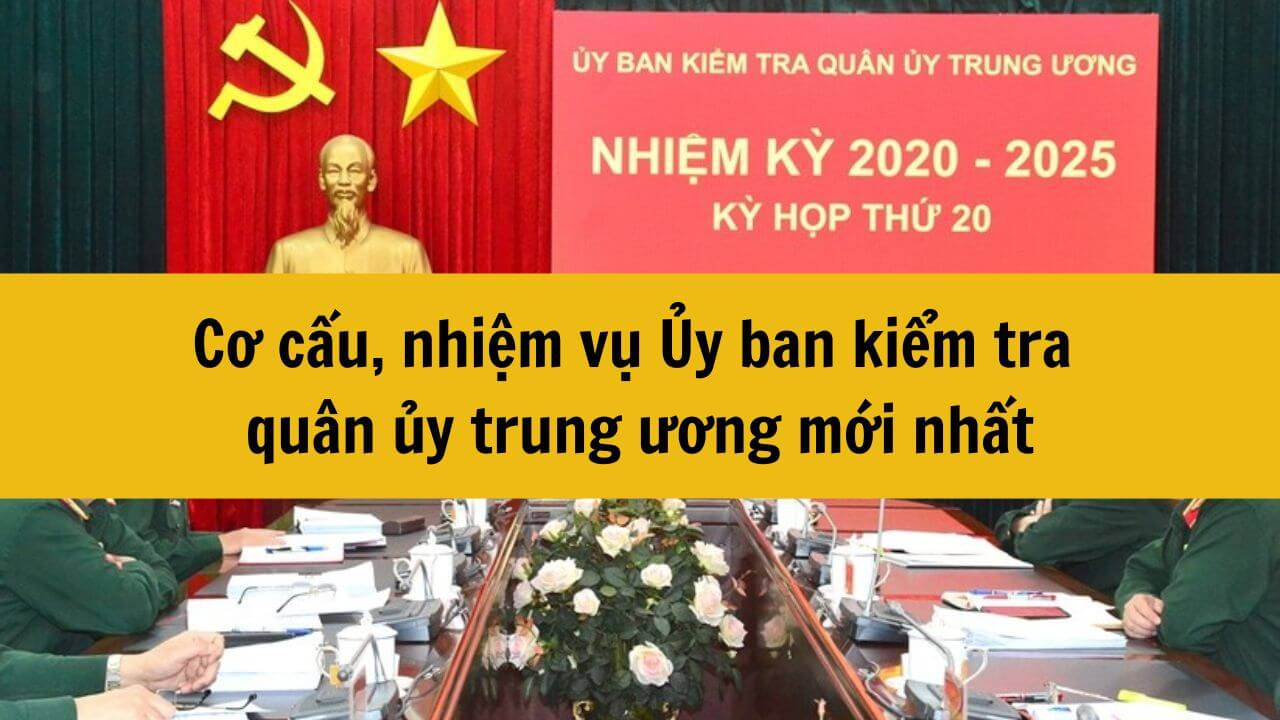
Cơ cấu, nhiệm vụ Ủy ban kiểm tra quân ủy trung ương mới nhất 2025
Ủy ban Kiểm tra Quân ủy Trung ương đóng vai trò quan trọng trong việc bảo đảm kỷ luật, kiểm soát và nâng cao hiệu quả hoạt động của lực lượng vũ trang nhân dân Việt Nam. Năm 2025, trong bối cảnh đất nước đối mặt với nhiều thách thức mới, cơ cấu và nhiệm vụ của Ủy ban này càng trở nên cần thiết và cấp bách hơn bao giờ hết. Vậy hiện nay, pháp luật quy định ra sao về cơ cấu, nhiệm vụ Ủy ban kiểm tra quân ủy trung ương? 21/11/2024Nhiệm vụ, quyền hạn Cục Điều tra hình sự Quân đội nhân dân Việt Nam mới nhất 2025

Nhiệm vụ, quyền hạn Cục Điều tra hình sự Quân đội nhân dân Việt Nam mới nhất 2025
Trong bối cảnh an ninh quốc gia và trật tự xã hội ngày càng phức tạp, Cục Điều tra hình sự Quân đội nhân dân Việt Nam đóng vai trò quan trọng trong việc bảo vệ và thực thi pháp luật. Bài viết này sẽ đi sâu vào các nhiệm vụ và quyền hạn của Cục Điều tra hình sự theo quy định pháp luật hiện hành, từ đó làm rõ vai trò của đơn vị trong việc bảo vệ tổ quốc và xây dựng một lực lượng vũ trang tinh nhuệ, hiệu quả. 21/11/2024Cơ cấu tổ chức, nhiệm vụ quyền hạn Viện kiểm sát quân sự trung ương mới nhất 2025

Cơ cấu tổ chức, nhiệm vụ quyền hạn Viện kiểm sát quân sự trung ương mới nhất 2025
Trong bối cảnh quốc phòng và an ninh ngày càng được chú trọng, vai trò của Viện kiểm sát quân sự Trung ương trở nên ngày càng quan trọng trong việc bảo đảm sự tuân thủ pháp luật và bảo vệ quyền lợi của nhà nước, tổ chức và cá nhân. Năm 2025, quy định về cơ cấu tổ chức, nhiệm vụ và quyền hạn của Viện kiểm sát quân sự Trung ương đã và đang ngày càng được hoàn thiện, nhằm đáp ứng yêu cầu nhiệm vụ trong tình hình mới. 21/11/2024Cơ cấu tổ chức, nhiệm vụ quyền hạn Tòa án quân sự khu vực mới nhất 2025
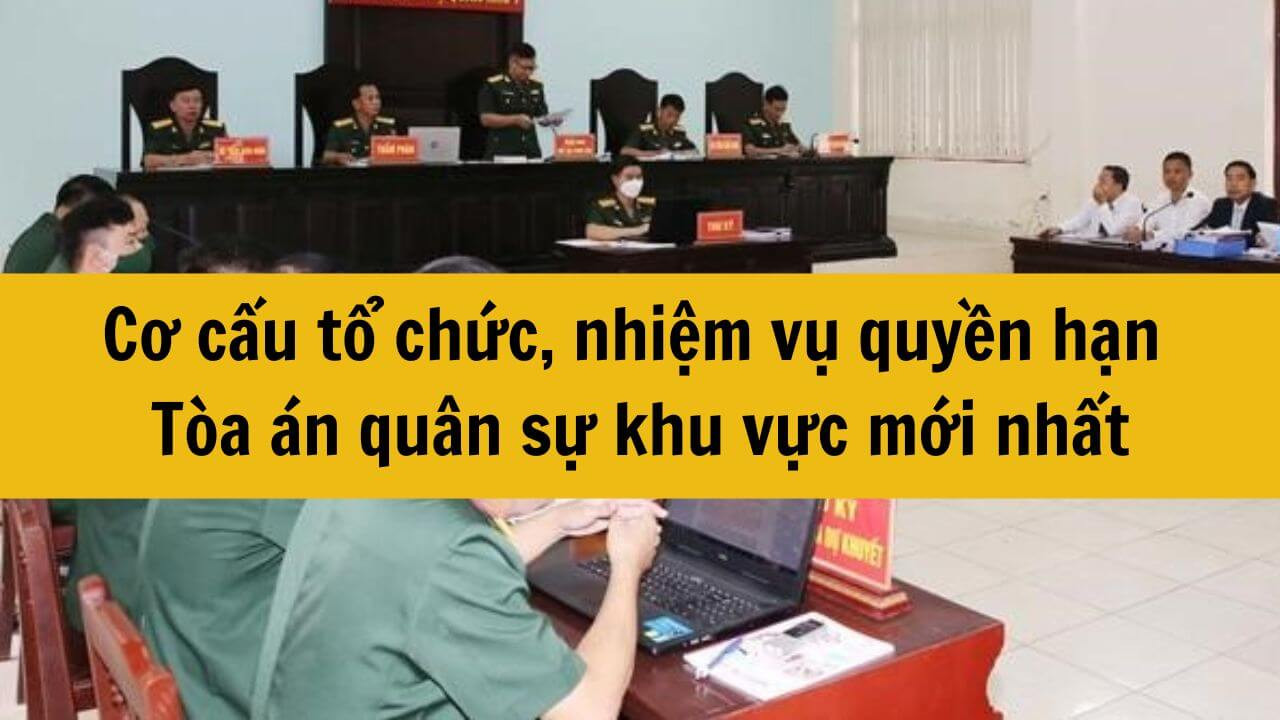
Cơ cấu tổ chức, nhiệm vụ quyền hạn Tòa án quân sự khu vực mới nhất 2025
Năm 2025 các quy định mới nhất về Tòa án quân sự nói chung và Tòa án quân sự khu vực nói riêng đã và đang ngày càng được hoàn thiện nhằm nâng cao hiệu quả hoạt động và đảm bảo quyền lợi chính đáng cho các quân nhân cũng như cán bộ, chiến sĩ. Vậy hiện nay, nhiệm vụ, quyền hạn, cơ cấu tổ chức của Tòa án quân sự khu vực được quy định ra sao? 21/11/2024Cơ cấu tổ chức, nhiệm vụ quyền hạn Tòa án quân sự quân khu mới nhất 2025
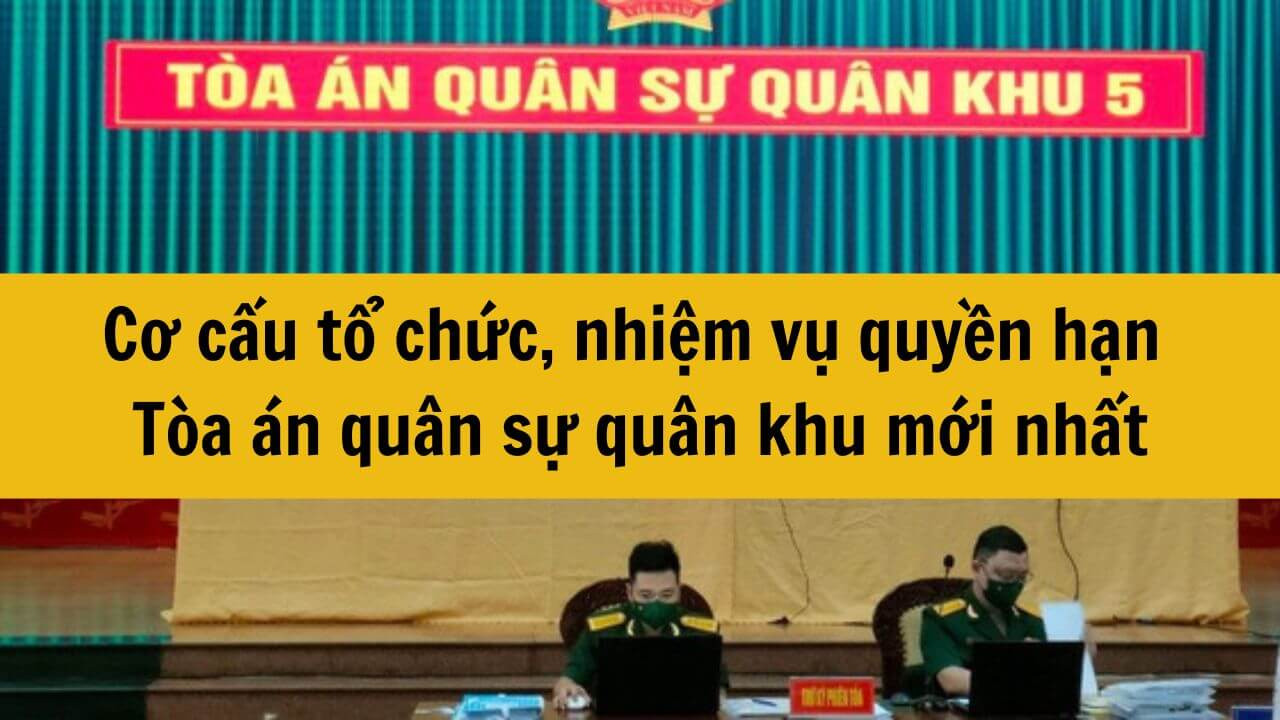
Cơ cấu tổ chức, nhiệm vụ quyền hạn Tòa án quân sự quân khu mới nhất 2025
Trong bối cảnh hiện nay, việc cải cách hệ thống tư pháp quân sự đóng vai trò quan trọng trong việc bảo vệ pháp luật và trật tự xã hội. Hiện nay, bộ máy Tòa án quân sự đang ngày càng được hoàn thiện, trong đó Tòa án quân sự quân khu đóng vai trò quan trọng. Hiện nay pháp luật quy định ra sao về nhiệm vụ, hoạt động, cơ cấu tổ chức của Tòa án quân sự quân khu? 21/11/2024Cơ cấu tổ chức, nhiệm vụ quyền hạn Tòa án quân sự trung ương mới nhất 2025
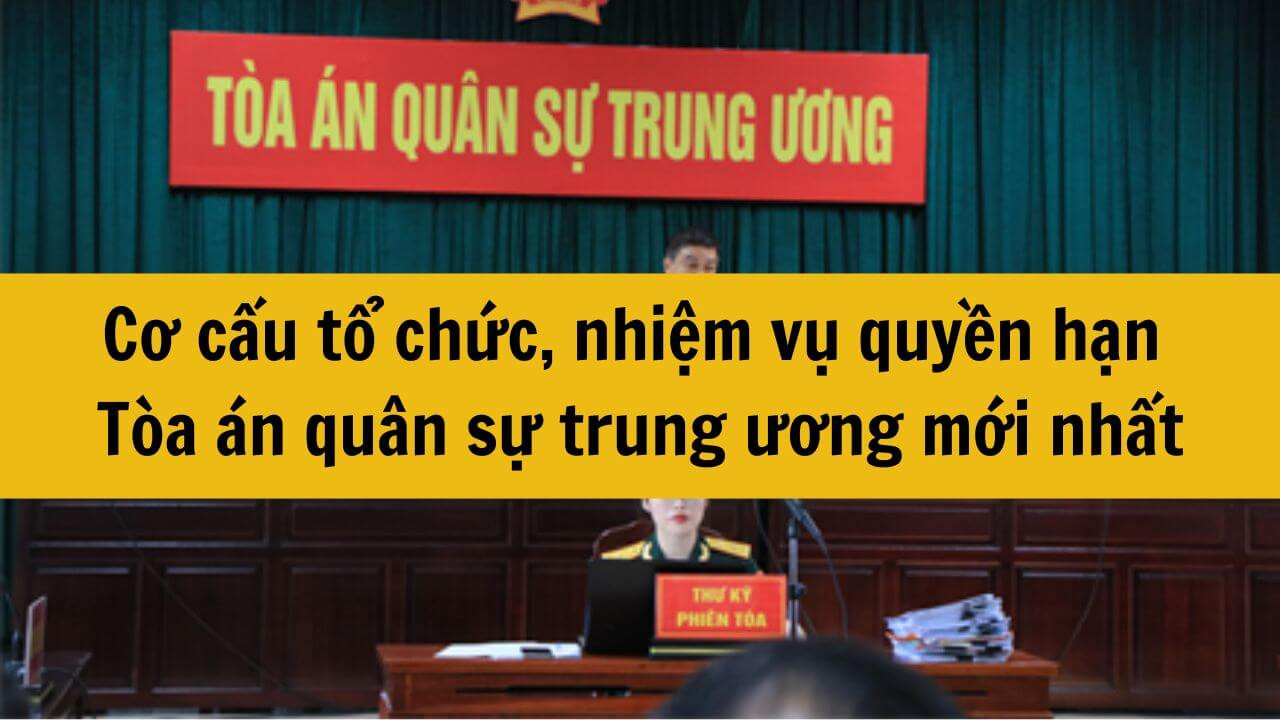
Cơ cấu tổ chức, nhiệm vụ quyền hạn Tòa án quân sự trung ương mới nhất 2025
Trong bối cảnh an ninh quốc gia ngày càng trở nên phức tạp, việc cải cách hệ thống tư pháp quân sự đóng vai trò quan trọng trong việc bảo vệ pháp luật và trật tự xã hội. Hiện nay, bộ máy Tòa án quân sự đang ngày càng được hoàn thiện, trong đó đứng đầu là Tòa án quân sự trung ương. Vậy hiện nay pháp luật quy định ra sao về nhiệm vụ, hoạt động, cơ cấu tổ chức của Tòa án quân sự trung ương? 21/11/2024Quy định mới nhất 2025 về Tòa án quân sự
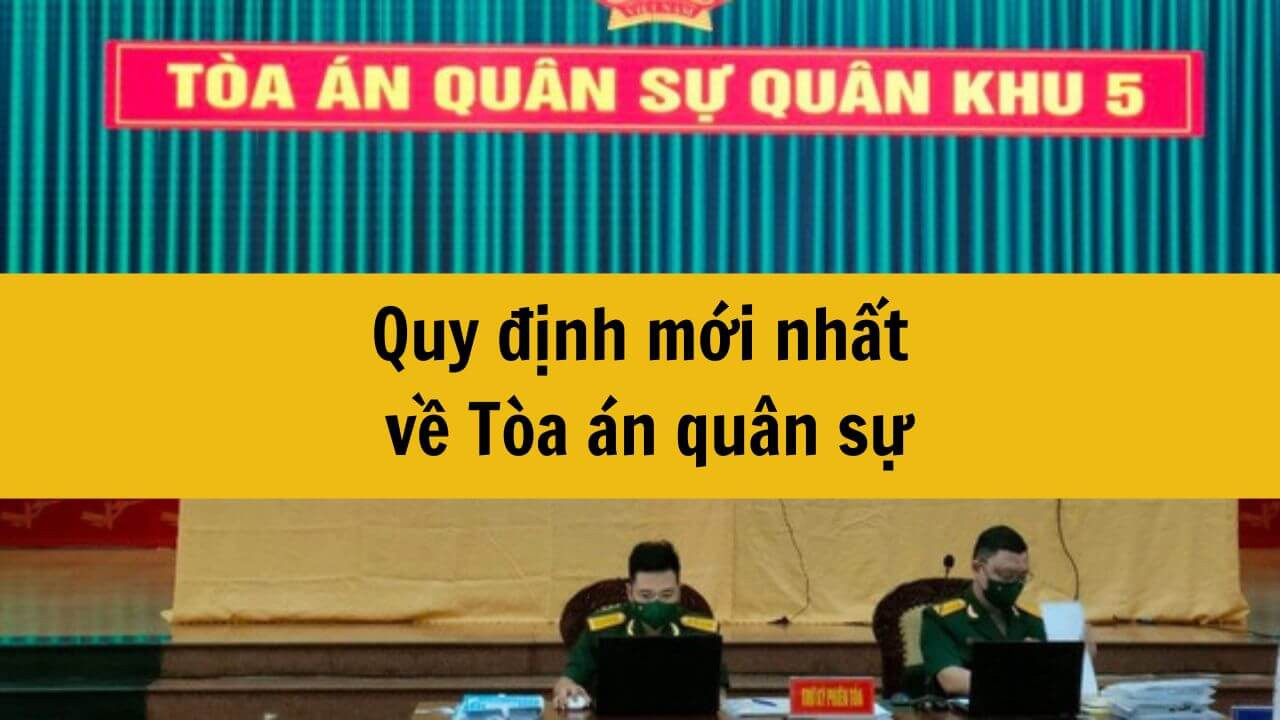
Quy định mới nhất 2025 về Tòa án quân sự
Trong bối cảnh an ninh quốc gia ngày càng trở nên phức tạp, việc cải cách hệ thống tư pháp quân sự đóng vai trò quan trọng trong việc bảo vệ pháp luật và trật tự xã hội. Năm 2025 các quy định mới nhất về Tòa án quân sự đã và đang ngày càng được hoàn thiện nhằm nâng cao hiệu quả hoạt động và đảm bảo quyền lợi chính đáng cho các quân nhân cũng như cán bộ, chiến sĩ. 21/11/2024Những ngành nghề cần có bằng cử nhân Luật

Những ngành nghề cần có bằng cử nhân Luật
Bằng cử nhân luật mở ra rất nhiều cơ hội nghề nghiệp đa dạng và hấp dẫn. Với kiến thức chuyên sâu về pháp luật, người tốt nghiệp ngành luật có thể lựa chọn làm việc tại nhiều lĩnh vực khác nhau. Dưới đây là một số ngành nghề phổ biến mà bạn có thể tham khảo. 06/11/2024Civil Law là gì? Việt Nam theo hệ thống pháp luật nào? Common Law hay Civil Law?
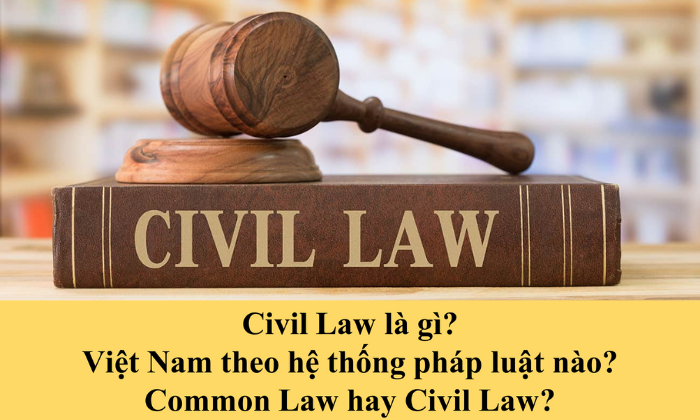
Civil Law là gì? Việt Nam theo hệ thống pháp luật nào? Common Law hay Civil Law?
Civil Law là gì? Việt Nam theo hệ thống pháp luật nào? Common Law hay Civil Law? 04/11/2024Văn bản quy phạm pháp luật là gì?


 Luật tổ chức Toà án nhân dân 2014 (Bản Word)
Luật tổ chức Toà án nhân dân 2014 (Bản Word)
 Luật tổ chức Toà án nhân dân 2014 (Bản Pdf)
Luật tổ chức Toà án nhân dân 2014 (Bản Pdf)